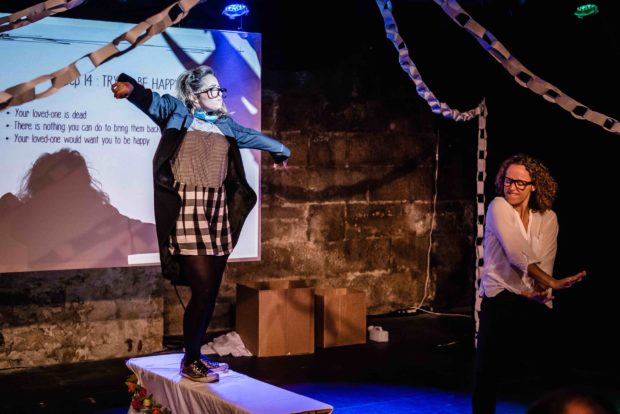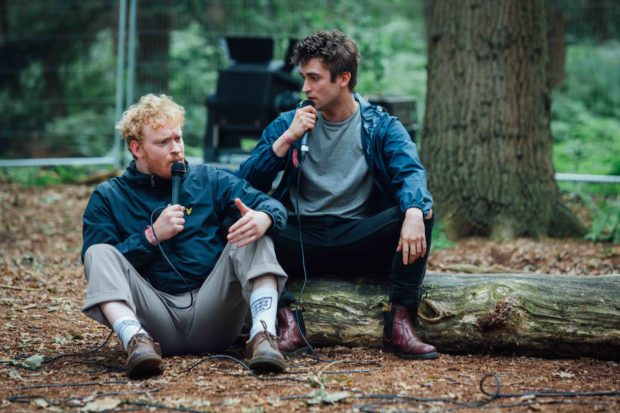You have no items in your cart. Want to get some nice things?
Go shopping
Natural Shocks’ My World Has Exploded a Little Bit, subtitled A Logical, Philosophical Guide to Managing Mortality, is exactly that: a guide to dealing with death. Performed in the style of a lecture, Bella Heesom takes the audience through a 17-step guide to managing the news that a loved one is going to die. This could easily be a morbid and dark play, reflecting the subject matter, but Bella’s humour and charm alleviates many of the dark moments. In fact, the show is surprisingly silly: with Bella’s sidekick Eva Alexander playing some ridiculously funny piano numbers and bringing a lot of much-needed levity and wackiness to the subject matter through her stooge-like interactions with Bella. Equally, there are some lovely, understated pieces of dialogue and narrative description – tender and tragic moments – that ensure that the show doesn’t fall under the weight of slapstick. The supporting animation and music that plays during the more heartfelt moments is also beautifully put together.
Ultimately, Bella subverts her logical guide to managing death, raging against its inadequacy: she blames herself for following the guidance by rote when it came to her mother’s death, thereby repressing her natural feelings and not allowing herself to grieve fully. A thoughtful meditation on death and the grieving process, it is easy to see why My World Has Exploded a Little Bit gained such acclaim when it showed at the Edinburgh Fringe last year.

Crew for Calais’s production BORDERLAND // CALAIS tackles the highly topical and hard-hitting subject of the Calais Jungle refugee camp. It is split into two parts. In the first part, BORDERLAND, speakers Prasanna Puwanarajah and Stephanie Street read out a set of statistics taken from the Refugee Rights Data Project that damningly highlight failures in the care of refugees. Reciting articles from the European Convention on Human Rights – particularly those entitling every individual to equal rights to life, freedom from torture and safe childbirth – they contrast this with real-life refugee accounts and statistics. This starkly shows how these theoretical entitlements have been far from upheld in the treatment of refugees.
In the second part, CALAIS, a performer narrates the final days of the Calais Jungle demolition, woven from the Twitter streams of the Refugee Info Bus and Help Refugees. The picture painted is bleak, with a lack of coherent information being given to the refugees at Calais about the demolition, leading to protests at the camp and harsh shows of police brutality. Much is also made of the UK’s shameful failure to protect unaccompanied child refugees. BORDERLAND // CALAIS is an urgent appeal for us to recall our collective humanity and aid the refugees.

Finally, Poleroid Theatre and award-winning writers Brad Birch and Kenneth Emson are the team behind This Must Be the Place, a wildly successful show at the VAULT Festival (with every performance sold out and an extra matinee added due to demand.)
Quick-fire, witty repartee between the show’s characters is interspersed with more meditative, discursive material from the character Adam. Adam is a kind of modern day Everyman of our iPhone and Netflix-obsessed, self-involved generation. He powerfully explores the tension in the fact that we are, in many ways, more connected than we have ever been through social media – and yet often feel intensely isolated and disconnected from one another. At the very beginning of the show, Adam drops his iPhone into the Thames, as a symbolic renunciation of our shallow, social media-driven culture. He then takes a neighbour’s bike and escapes from London, cycling to the small town he’s originally from.
The play cuts back and forth from the story of Adam’s escape to another story of escape – that of two friends who are fleeing their own lives in the North for what they imagine will be a better life in London. In a sort of modern reimagining of Waiting for Godot, these characters wait for a driver to pick them up and take them. Text messages from their mysterious late driver lead them to the realisation that they’ll be ripped off by him, and the ending is left ambiguous: will the driver appear? Will they choose to go to London, or not?
Masterfully written, This Must Be the Place could nonetheless benefit from a better tying-together of the two tales: Adams’s and that of the two friends waiting for their driver. Nonetheless, it’s an entertaining, rollicking ride, with enough substance to mark it as a fine piece of theatre.
To find out more about Crew for Calais and their use of the creative arts to help refugees, visit their website.

About Ana Malinovic
Ana graduated from Warwick University with a BA in English and American Literature in 2010. Her dissertation was centred on dystopian elements in the fiction of Kafka. She enjoys uncovering innovative works of fiction by a diverse range of authors. She also spends much of her time roaming around London's arts and culture scene overexcitedly. Check out her blog




